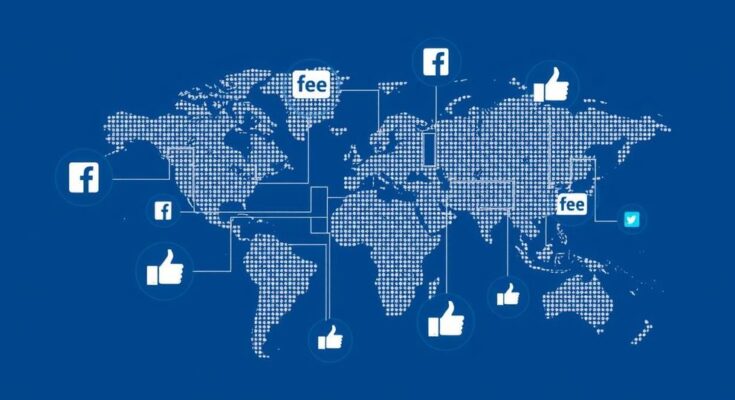Facebook, launched in 2004, has evolved from a college networking site to a global social media giant with over 2 billion daily users. It revolutionized social media, monetized users’ personal data, impacted political campaigns, and grew into the extensive Meta empire. Facing challenges regarding data ethics and competition, its future direction towards the Metaverse raises questions about its ongoing relevance.
On the occasion of its 20th anniversary, Facebook, originally called The Facebook, showcases a journey from a simple site for connecting college students to a vast platform that touches billions globally. Its interface has undergone numerous redesigns, yet its core goal remains unchanged: fostering connections and generating substantial advertising revenue. As we reflect on its impact, here are four transformative ways Facebook has reshaped our world. 1. Revolutionizing Social Media: Facebook’s launch in 2004 marked a seismic shift in online social interaction. It quickly outpaced earlier platforms like MySpace, attracting one million users within its first year. Innovations, such as photo tagging, captivated the youth, transforming social interactions into a vibrant digital experience. As it expanded globally and offered internet access in under-connected regions, Facebook grew its user base to 2.11 billion daily users by 2023, despite facing competition from younger platforms. 2. Monetizing Personal Data: Facebook demonstrated how personal data could be both valuable and vulnerable. Its transformation into Meta saw it soar to advertising dominance, reporting over $40 billion in revenue in late 2023 alone. However, as it amassed significant data through likes and preferences, Meta has faced scrutiny and legal repercussions over data privacy issues, including the notorious Cambridge Analytica scandal, raising questions about user trust and data ethics. 3. Political Influencer: Facebook’s targeted advertising has revolutionized political campaigns, enabling them to engage with voters on new levels. During critical elections, such as the 2020 US Presidential campaign, political spending surged, showcasing its influence. Moreover, platforms like Facebook played pivotal roles in global movements, notably during the Arab Spring, offering a space for organizing and real-time news dissemination, albeit not without consequences regarding human rights and safety. 4. Catalyst for Meta’s Expansion: Facebook’s early success paved the way for the creation of a vast tech empire under Mark Zuckerberg, which includes Instagram, WhatsApp, and Oculus. Meta’s reach now surpasses three billion users across its products daily. While acquisitions have solidified its power, Meta has also faced accusations of mimicking competitors’ features to safeguard its position, encountering strict regulations that challenge its dominance and future growth. As we approach the next two decades, Facebook’s enduring presence reflects Zuckerberg’s strategies to adapt and evolve. Previous skepticism about the platform’s longevity has faded, yet keeping its crown amidst rapid changes remains daunting. Meta’s current pivot towards the Metaverse and artificial intelligence signifies a shift in focus, creating uncertainty about Facebook’s trajectory and relevance, even as it retains a massive user base.
Facebook emerged in 2004, launched by Mark Zuckerberg and fellow students at Harvard University, initially aimed at connecting college students. Its simplistic design quickly evolved as its user base surged, reshaping the social media landscape. Emerging alongside other platforms, Facebook developed unique features that drew users in and set a new benchmark for engagement and interactivity on the internet. Today, it stands as a significant player not just in social media but also in global advertising and politics, influencing communication and interaction on numerous levels.
In summary, Facebook has remarkably transformed social media, personal data valuation, political campaigning, and corporate expansion over its two-decade journey. Despite facing challenges and evolving criticisms, it remains a potent force in the digital landscape, with a massive influence on social connectivity and user engagement. As it moves towards a future possibly centered around the Metaverse, questions about its enduring relevance will continue to surface, reflecting the complex relationship between technology, society, and individual privacy.
Original Source: www.bbc.com



